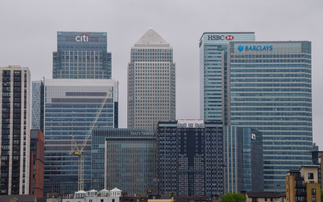In wake of Paris climate deal, coal giant Peabody sees share price fall, while renewables stocks enjoy an encouraging day
On the sidelines of the Paris talks last week there was plenty of speculation as to whether or not the eventual agreement would send a strong enough signal to move global markets. The general consensus appeared to be no one should expect share prices to move on Monday morning, given the signals provided by the Paris Agreement were long term in nature.
But yesterday did see some movement in the markets that observers were keen to attribute, at least in part, to the Paris Agreement and its declaration that the world is now on a path to a net zero emission future.
Most notably, US coal giant Peabody recorded a further drop in its valuation yesterday, while a number of renewable energy companies saw an uptick in their share prices.
Peabody's share price fell by more than 10 per cent on Monday morning, which some onlookers have attributed to the impact of the global climate deal.
"Clearly Paris was all about the message it sends out to the rest of the world that we're serious about cutting carbon emissions and coal is going to be one of the first things to go," said Lady Bryony Worthington, Shadow Energy and Climate Change Minister on BBC Newsnight.
The fall in Peabody stocks could also be attributed to a wider drop in commodity prices, but analysts are forecasting the Paris outcome will have a very real impact on markets in the long term.
Barclays yesterday issued a research note predicting the Paris deal will drive more investors to decarbonise their portfolios. At the same time a number of renewable energy companies, including wind turbine companies Vestas, Nordex and Gamesea, saw their share prices rise. And Norway's REC Silicon, a solar technology supplier, saw its share price surge 10 per cent.
In a research note issued yesterday, Barclays' Mark Lewis said the Paris climate deal has highlighted the risks of investing in the incumbent energy sector, which in turn "has prompted an increasing focus on the part of institutional and sovereign investment funds on the carbon intensity of their portfolios".
Lewis said the final wording agreed in the text represents "a very significant" breakthrough in the history of international climate negotiations, and he particularly welcomed the commitment by countries to ratchet up their carbon targets twice a decade.
"We think the Paris Agreement represents a strong outcome and will therefore help boost the long-term fundamentals of the capital-goods and low-carbon power-generation sectors while weakening the long-term fundamentals of fossil-fuel industries," he wrote. "At the same time, we think that it will reinforce financial regulators' interest in climate and carbon-pricing risk, and that it will give further impetus to growing investor initiatives around portfolio decarbonisation."
Meanwhile, the coal industry in Europe has already raised concerns about the fallout from the deal. According to Euractiv, the head of Europe's coal trade body has warned the landmark deal will cause coal to be "hated and vilified in the same way that slave traders were once hated and vilified".
Brian Ricketts, secretary-general of the European Association for Coal and Lignite, allegedly wrote to members, predicting keep it in the ground campaigns will morph into "put it back in the ground" campaigns.
"You might be relieved that the agreement is weak. Don't be," he wrote. "The words and legal basis no longer matter. Fossil fuels are portrayed as public enemy number one."
He warned that the Paris Agreement was based on a "UN lie" about the potential of renewable energy to power the planet, arguing that COP21 only "boosted egos" without any real substance.
Europe's biggest business lobby group also poured cold water on the deal, warning that European competitiveness remains at risk unless other countries upgrade their climate action plans.
"The Paris deal is an important step forward for global efforts to reduce emissions, but we were hoping that other countries would increase their ambition to closer to that of the EU," said Emma Marcegaglia, president of BUSINESSEUROPE. "It is important that all major economies make comparable efforts as soon as possible."
But Nigel Topping, chief executive of the We Mean Business Coalition, said it was now in countries' own interests to boost their green policies.
"The reverse of that is that countries that don't move fast enough will have a retrograde industrial policy," he told BusinessGreen.
He also countered coal industry concerns that it is being victimised in some way, arguing that "no one is trying to pick out any players". "We're going through a disruptive industrial change and that's part of a free market," he said.
He added that the climate deal would be challenging to deliver particularly for coal-rich countries. "We do need to make sure national governments with large coal industries as they close down will put in place policies that seek to retrain and reskill those workers," he said. "That's far from vilifying. This deal does signal the end of coal as the fuel of choice for the world by 2050."
This article is part of BusinessGreen's Road to Paris hub, hosted in association with PwC.









